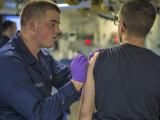Feb 11, 2003 (CIDRAP News) A group of universities and private companies have launched an effort to harness donated computer time from millions of personal computers in the hunt for a drug to treat smallpox.
The Smallpox Research Grid Project will use personal computers around the world to analyze interactions between 35 million potential drug molecules and several smallpox virus proteins, according to United Devices, the company coordinating the effort.
The results of the project will be delivered to the US Department of Defense (DoD), officials said. In a similar project last year, a consortium searched for an anthrax antitoxin and turned over data on 300,000 proteins to the US and British governments.
The smallpox project involves researchers at Oxford and Essex Universities in the United Kingdom, the University of Western Ontario, the Robarts Research Institute, and Sloan-Kettering Cancer Center. They are working with United Devices, IBM, Accelrys, and Evotec OAI.
There is no known effective treatment for smallpox. Oxford officials said in a statement on their Web site, "There is a possible molecular target whose blockade would prevent the ravages of an infection, and we intend to use desktop grid computing to screen millions of potential anti-smallpox drugs against this target. . . . The project can muster almost two million personal computers belonging to people in over two hundred countries, all of whom would benefit from protection against smallpox."
Computer owners can join the project by downloading a screensaver at www.grid.org, according to United Devices. The screensaver program will use the computer's idle processing power to request data from United Devices, analyze it, and return the results, the company said.
United Devices said it is coordinating all aspects of the project, while IBM is providing the computer infrastructure. Accelrys is supplying the software used to screen compounds, and Evotec OAI has contributed "drug modeling expertise" to the project.
Researchers leading the effort include Grant McFadden of Robarts Research Institute and the University of Western Ontario; Stewart Shuman of Memorial Sloan-Kettering; Graham Richards, chairman of the Oxford chemistry department; and Chris Reynolds of the biological sciences department at Essex University.
The US Army Medical Research Institute of Infectious Diseases will manage the project for DoD and will be among the institutions that will further analyze the most promising drug candidates after the project is finished, United Devices officials said.
See also:
Oxford University statement
http://www.chem.ox.ac.uk/smallpox/



















